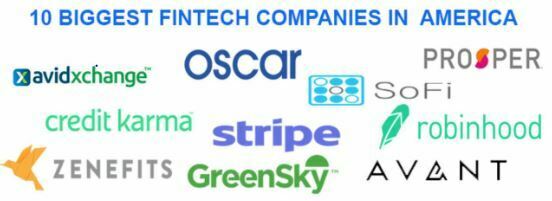Fintech is the combination of finance and technology and companies in that realm are using it to solve problems and advance classic industries like banking, insurance, investing, and a host of others. Fintechs are companies that are integrating the financial services value chain with technological solutions to provide advanced financial products.
In the big picture, the term ‘financial technology’ can apply to any innovation in how people transact business, from the invention of digital money to double-entry bookkeeping, and the pandemic has only added fuel to the fire of this sector. Since the internet revolution and the advent of smartphones, financial technology has grown explosively, and fintech, which was originally referred to as computer technology applied to the back office of banks or trading firms, now describes a broad variety of technological innovations in personal and commercial finance.
The image below represents the ten largest in America. Some you may know, some you’ve never heard of.

I happen to run across Affirm, a fintech company that seeks to replace the need for credit cards in the online shopping arena. I was looking at a kayak that was at a price point in my mind where I would rather make payments on it than shell out the whole purchase price upfront. Sure enough, in the checkout process, Affirm is available to give me an instant credit approval (or denial) for the product.
Terms and payment schedules appear instantly. How easy and cool. This is the type of niche that fintech is attempting to enter. Another example is Better Mortgage, which attempts to fast-track the mortgage process and obviate the need of a traditional lender and provide you with a pre-approval letter within 24 hours. Again, pretty nifty.
The consumer market for fintech companies and products is generally younger and targeted to those who would likely be more familiar with their products and services. The fact is that consumer-oriented fintech is mostly targeted toward millennials given the huge size and rising earning potential of that market segment.
Some fintech watchers believe that this focus on millennials has more to do with the size of that marketplace than the ability and interest of Gen Xers and Baby Boomers in using fintech. Rather, fintech tends to offer little to older consumers because it fails to address their problems. Let’s take a look at 5 fintech ETFs that might be appropriate for your investment portfolio.
Global X FinTech ETF FINX
AUM $886 million
YTD -30.40%
Vol 311,641
The Global X FinTech ETF is the oldest and most established on the list. With over five years of track record in public markets, FINX is a legitimate ETF with clear interest behind it. FINX seeks to invest in companies on the leading edge of the emerging financial technology sector, which encompasses a range of innovations attempting to transform established industries like insurance, investment, fundraising, and third-party lending through unique mobile and digital solutions. The top 10 holdings include Square, PayPal, Intuit, Fiserv, and more. FINX has 40 holdings and an expense ratio of 0.68%.
ARK Fintech Innovation ETF ARKF
AUM $1.54 billion
YTD -45.65%
Vol 1.7 million
Perhaps the most infamous fund, Ark, managed by the ubiquitous Cathie Wood, alleges to be on the vanguard of disruptive technology. ARK has seen crazy capital inflows since its genesis in 2019, but recently, for better or for worse, funds have been flowing out at a record pace, as technology holdings like Teladoc, down some 40%, are curbing investor enthusiasm. ARKF is actively managed, allowing managers to select and weight constituent stocks as they see fit. ARK as a whole is focused on industry-changing companies and has an almost eternal investment horizon.
ETFMG Prime Mobile Payments ETF IPAY
AUM $871 million
YTD -19.00%
Vol 147,621
IPAY is an ETF that provides a benchmark for investors interested in tracking the mobile and electronic payments industry, specifically focusing on credit card networks, payment infrastructure and software services, payment processing services, and payment solutions (such as smartcards, prepaid cards, virtual wallets). It features such names as PayPal and Block along with blue chips like Visa and smaller players like PaySign that are seeking a piece of the mobile payments pie.
Ecofin Digital Payments Infrastructure Fund TPAY
AUM $9.9 million
YTD -19.00%
Vol 1,247
While amassing less year to date losses than its competitors, this is one of the smaller players in the fintech space, and as such one must be careful and consider the liquidity of the investment. This, in my opinion, would be a longer term hold because of the lack of liquidity. With that said, TPAY focuses on the infrastructure required for 21st-century transactions rather than trying to pick stocks that process the most volume. Two of its largest holdings are names you are probably familiar with. One is Fiserv, which offers risk management and compliance services as well as technology services to banks. A Second is DocuSign, another holding that provides security and verification services.
Capital Link Global Fintech Leaders ETF KOIN
AUM $22.5 million
YTD -15.20%
Vol 2,854
As the name would suggest, KOIN is looking to hold global fintech companies that track the AF Fintech Leaders Index. This basically has two components. Digital Asset Providers that optimize settlement or security or create digital assets, and Solution Providers that assist companies in adopting that technology.
This international ETF holds names that you might be familiar with, such as China Construction Bank, Singapore Exchange, Baidu (BIDU), and Tencent Holdings. The heavy emphasis on Asia, and China, in particular, make this a risk-on ETF in the current political and economic climate.











